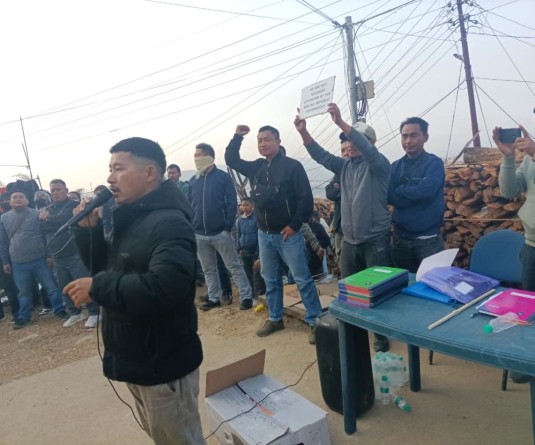
• Insists open advertisement essential for constitutional validity of Rule 20
• Denies demands for concessions other than age
• Proceedings indicate State Govt unlikely to appeal
Morung Express News
Dimapur | September 22
In the significant ruling on September 20, the Gauhati High Court Kohima Bench (GHCKB) invalidated the appointments of 935 constables in Nagaland that were made between January 2018 and October 2019 without advertisement.
The judgment, authored by Justice Devashis Baruah, emphasised that the Nagaland Government's reliance on Part III of the Nagaland Police Manual to justify these appointments was insufficient to satisfy the court.
The court also addressed the government's subsequent request for concessions regarding these constables, particularly after they expressed intentions to conduct new recruitment.
However, the court rejected all relaxations aside from age, maintaining the importance of adhering to proper recruitment procedures.
The ruling came in response to a series of petitions filed in 2022 that challenged the legality of the appointments made without advertisement.
Arguments in Court
As per the Court’s order, the petitioners via their counsel Z Zhimomi submitted that they are indigenous unemployed Naga youth possessing requisite eligibility criteria to various 935 constables appointed on regular basis without any advertisement.
The petitioners referenced an Office Memorandum (OM) dated July 7, 1976, stating that no direct recruitment should occur without publicly inviting applications.
Through the Right to Information Act, they discovered that of 1,140 constable posts, only 206 were filled via open recruitment, while 935 were appointed without advertisement.
These appointments were made through "backdoor" denying thousands of eligible unemployed Naga youths the opportunity, the petitioners argued.
In response, the State of Nagaland raised preliminary objections regarding the maintainability of the writ petitions.
The State respondents initially contended that the appointments were governed by Part III of the NP Manual, established under Article 309 of the Constitution and published in the Nagaland Gazette on August 31, 2018.
Rule 20 does not require an advertisement as a prerequisite for recruiting constables or non-commissioned employees, asserting that the lack of an advertisement cannot be a valid ground to challenge the appointments without contesting the "vires of Rule 20" itself, they maintained.
They also cited an OM dated December 7, 2016, from the Department of Personnel and Administrative Reforms, which outlined procedures for filling Grade-III and Grade-IV posts without requiring an advertisement.
The 1976 OM cited by the petitioners was merely an executive instruction, while the NP Manual is a statutory rule under Article 309 of the Constitution, they added.
Similar submissions were also made by private respondents (935 constables).
A twist
On June 6 of this year, the Court inquired whether a Selection Committee had been constituted and requested related details from the State Respondents.
In a twist response, the State filed an affidavit on July 25, 2024, noting that the Office of the Director General of Police, Nagaland, had proposed to the Home Commissioner to regularise the appointment of 935 in-service constables from 2018-2019 through advertising the posts.
Necessary relaxations were also sought for the in-service constables who have undergone full-fledged basic training and given exemplary service in Nagaland and beyond, particularly during election duties.
Thus, taking their past experiences in field operations, a “small” liberty in terms of physical criteria and in qualifying marks was sought.
Accordingly, the Court noted that the State Government appears to have decided to set aside all 935 appointments and proceed with fresh recruitment but considering relaxations.
On seeking further clarity, the AG submitted an affidavit on August 20 stating the minimum recruitment age as 18 and maximum as 35 years in Nagaland and out of the 935 constables, about 93 have exceeded the maximum age, 270 are aged 30-35, and approximately 533 are around 25-30 years old.
The affidavit noted that many prospective candidates may apply at 18, while serving constables could be at least 10 years older, with some twice their age and noted the need for relaxations in physical activity requirements to ensure older constables can compete with younger candidates.
The affidavit also emphasised that younger candidates are more tech-savvy and have more time to prepare for the written exam, while serving constables often work long hours and face demanding conditions.
It thus requested concessions for outdoor activities and the written test, noting that, aside from the lack of advertisement, the constables are otherwise qualified and appointed by competent authorities. A 10% weight for in-service personnel in the written test was also sought.
The AG noted that removing all 935 constables immediately could lead to a law and order crisis, estimating that it would take at least five months to fill the positions.
Meanwhile, the petitioners’ counsel argued that the appointments were "illegal" rather than "irregular," violating Articles 14 and 16 of the Constitution due to the lack of advertisement and does not need concession other than age, which should apply to petitioners who exceeded the age limit during the case.
Deciding factors
Analysing the submissions, the Court noted that while the State Respondents initially abandoned their reliance on Rule 20 of the NP Manual, it needed to be addressed as the nature of the appointments could only be determined based such analysis.
To this end, Justice Baruah noted that Article 13 of the Constitution states that laws inconsistent with fundamental rights in Part III are void and said that the NP Manual, made under Article 309, qualifies as law under Article 13(3)(a) and must conform to Part III of the Constitution.
The judge stated that Articles 14, 15, and 16 of the Constitution embody an "equality code" reflecting the preambular values of equality, opportunity, and social justice.
Citing a previous Supreme Court judgment, he emphasised that issuing an advertisement or calling for applications from eligible candidates is mandated by Articles 14 and 16 for filling State employment vacancies.
The requirement for an advertisement or inviting applications from eligible candidates must be ingrained into Rule 20 of Part III of the NP Manual and to uphold its constitutional validity of Rule 20 must be interpreted to imply these requirements, he added.
From the July 25 and August 20 submissions, the State of Nagaland had realised during the course of hearings these aspects and carrying out a fresh selection, he further noted.
Regarding other relaxations, the judge stated that they must be based on the nature of the appointments, highlighting that the Supreme Court has ruled that appointments made without advertisement are “illegal” and beyond age relaxation, no additional advantages can be conferred.
He also noted that the Constitution does not enable the State to provide any reservations in the form of relaxation in the case of illegal appointments.
The Constitution allows for substantive equality based on valid classification—an intelligible differentia that distinguishes one group from another and the key question is whether constables appointed without advertisement can be considered a separate group from those applying through an advertisement, he said.
As their appointments were "illegal and violative of Article 16," they cannot be classified separately and are therefore not entitled to any other relaxations, he added.
Citing Sub-Rule (3) of Rule 20 of Part II of the NP Manual, the judge stated that "sufficient intelligence and physique" are necessary for the proper discharge of constable duties.
Thus, the AG's submission was deemed "misconceived," as meeting the departmental physical criteria is essential eligibility.
The Court emphasised that appointments are for police constables, and failing to meet basic criteria would lead to inefficiency in the Police Force.
It also noted that the argument that older private respondents cannot compete with younger candidates is misguided, as all eligible candidates aged 18 to 35 can participate in the fresh selection process.
Hence, apart from age, the answer for other relaxations has to be in the negative, Justice Buraah held.
Ruling
Meanwhile, based on AG submission, the Court noted that the setting aside and quashing of the appointments 935 constables would create certain a void in the police forces and permitted the State Government to continue with their services till the new process of recruitment.
The constables were given option to continue in-service for a period of six months from the judgment or till such time fresh appointments or prepare for the exams.
The State Government was also directed to take steps for holding fresh selection of the 935 posts of Constables by issuance of advertisement in newspapers and completed process preferably within 6 months.
The upper age limit of both the in-service constables as well as the petitioners were relaxed but no such concessions were given for basic qualifications as well as the Departmental physical criteria.






